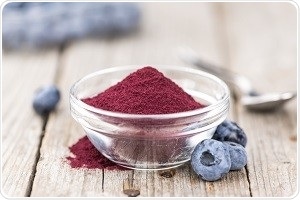It is not an easy task to sustainably feed the world’s growing population. That is why researchers are looking at options to convert the byproducts of fruits and vegetables—like pulp or peels that are disposed of during processing—into nutritious food supplements and ingredients.

Powders made from blueberries and persimmon waste is rich in antioxidants and could be good for the gut microbiome. Image Credit: Handmade Pictures/Shutterstock.com.
In the American Chemical Society’s Journal of Agricultural and Food Chemistry, scientists have now reported that persimmon and blueberry waste can be converted into antioxidant-rich powders that may have positive impacts on gut microbiota.
In the recent past, powders of fruits and vegetables have become popular as a means to introduce beneficial compounds, like carotenoids and polyphenols (two forms of antioxidants) in the diet, either as an ingredient in food products or by ingesting the powders directly.
But in several cases, such beneficial compounds are present either at analogous or even greater levels in byproducts when compared to those present in other parts of the vegetable or fruit.
Noelia Betoret, María José Gosalbes, and their collaborators wanted to extract powders from blueberry and persimmon wastes, and then analyze how digestion could influence the release of various bioactive compounds, including antioxidants. The team also wanted to find out the impacts of the digested powders on the growth of gut bacteria.
The scientists acquired a powder from persimmon flower parts and peels, and also a powder from the solids left behind after preparing the blueberry juice. The drying technique, the type of powder, the type of fiber, and fiber content governed the release of antioxidants in a replicated digestion.
For instance, while the freeze-drying method was able to preserve more anthocyanins, these were more easily decomposed at the time of digestion when compared to those in air-dried samples.
The researchers subsequently added the powders to fecal slurry and performed a mock colonic fermentation, which involved sequencing the existing bacteria both pre- and post-fermentation. Moreover, incubation with the fruit powders increased the number of many types of beneficial bacteria, and certain microbes also grew better with one powder when compared to the other.
The study results suggest that waste powders of blueberry and persimmon can possibly be incorporated in food formulations to increase the content of anthocyanins and carotenoids, which could have a positive effect on human health, concluded the scientists.
Source:
Journal reference:
Bas-Bellver, C., et al. (2020) Valorisation of Persimmon and Blueberry Byproducts to Obtain Functional Powders: In Vitro Digestion and Fermentation by Gut Microbiota. Journal of Agricultural and Food Chemistry. doi.org/10.1021/acs.jafc.0c02088.